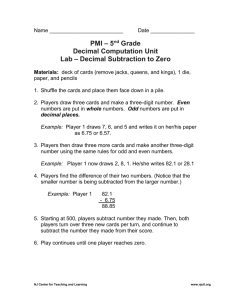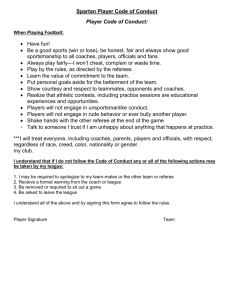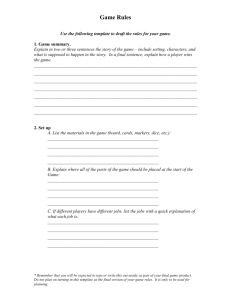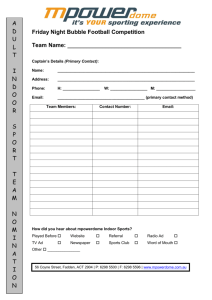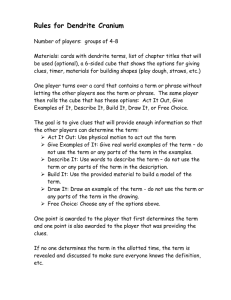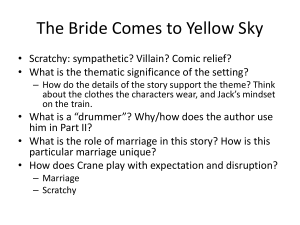Design Theory - Cheapass Games
advertisement
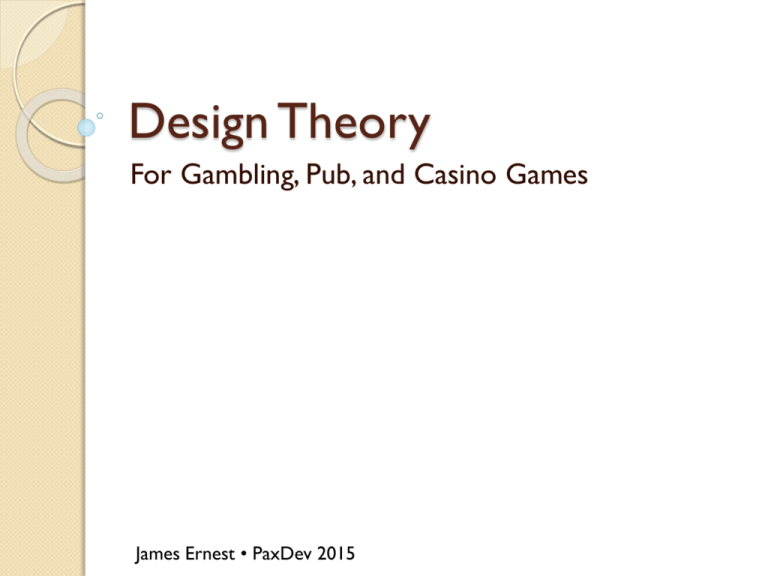
Design Theory For Gambling, Pub, and Casino Games James Ernest • PaxDev 2015 I Make Games Some Gambling Games I’ve Made Pairs ◦ ‘New Classic Pub Game” 2014 ◦ Lots of Pairs Variants Deadfall, Sweep, Blackstone, etc. Fable II Pub Games ◦ Wizard’s Tower ◦ Keystone ◦ Spinner Box Many games at cheapass.com ◦ ◦ ◦ ◦ Palomino, Red Baron Poker Suite (Willow, Barcelona, others) Renfield Chief Herman’s (Bogart, Crash, others) Who is This Lecture For? Who is This Lecture For? You Want To: ◦ Design a new gambling game Who is This Lecture For? You Want To: ◦ Design a new gambling game ◦ Create a new game or games within your RPG or alternate world Who is This Lecture For? You Want To: ◦ Design a new gambling game ◦ Create a new game or games within your RPG or alternate world ◦ Fix, analyze, or understand the appeal of an existing gambling game Who is This Lecture For? You Want To: ◦ Design a new gambling game ◦ Create a new game or games within your RPG or alternate world ◦ Fix, analyze, or understand the appeal of an existing gambling game The lecture you care about doesn’t start until 2:30 Basic Goals Simplicity without Tedium Depth without Confusion Lecture Outline Define Gambling, Casino, and Pub Games Describe Luck, Strategy, and Work Define “Fun” State Design Goals Analysis and Examples Definitions Gambling Games Casino Games Pub Games Definitions Gambling Games ◦ Casual Games, Scored with Money Easy to Learn Quick: 0-5 minutes per game Strong Luck Element Casino Games Pub Games Definitions Gambling Games ◦ Casual Games, Scored with Money Easy to Learn Quick: 0-5 minutes per game Strong Luck Element Casino Games ◦ Involve a “House” Player Different rules, always some advantage Pub Games Definitions Gambling Games ◦ Casual Games, Scored with Money Easy to Learn Quick: 0-5 minutes per game Strong Luck Element Casino Games ◦ Involve a “House” Player Different rules, always some advantage Pub Games ◦ No “House” Player Examples Casino Games ◦ ◦ ◦ ◦ ◦ Craps Slot Machines Blackjack Roulette Faro Examples Casino Games ◦ ◦ ◦ ◦ ◦ Craps Slot Machines Blackjack Roulette Faro Pub Games ◦ ◦ ◦ ◦ ◦ Poker Gin Rummy Liar’s Dice Baccarat Darts Examples Casino Games ◦ ◦ ◦ ◦ ◦ Craps Slot Machines Blackjack Roulette Faro Pub Games ◦ ◦ ◦ ◦ ◦ Poker Gin Rummy Liar’s Dice Baccarat Darts ◦ By these rules, a tournament of any casino game counts as a “pub” game ◦ Ergo, pigeonholes are never perfect. Metaphor Time Taking a Cruise Metaphor Time Taking a Cruise • Plenty of Options • Nothing is Required Metaphor Time Taking a Cruise • Plenty of Options • Nothing is Required • Primary Focus: Separate Customer from Money Metaphor Time Taking a Cruise • Plenty of Options • Nothing is Required • Primary Focus: Separate Customer from Money • Secondary Focus: Entertainment Luck Vs. Strategy Luck Strategy Luck Vs. Strategy Coin Flip Luck Strategy Luck Vs. Strategy Coin Flip Luck Chess Strategy Luck Vs. Strategy Coin Flip UNO Luck Chess Monopoly Scrabble Strategy Luck Vs. Strategy Coin Flip Slot Machine Candy Land UNO Luck Chess Monopoly Scrabble Strategy Luck Vs. Strategy Coin Flip Slot Machine Candy Land UNO Luck Tic-Tac-Toe Checkers Chess Monopoly Scrabble Strategy Luck Vs. Strategy Coin Flip Slot Machine Candy Land Tic-Tac-Toe Checkers Chess EVERYTHING ELSE Luck Strategy Luck And Strat: Separate Axes Strategy Luck Luck And Strategy Strategy Each axis represents the number of strategy- or luckbased decisions in the game. Luck Luck And Strategy Strategy Each axis represents the number of strategy- or luckbased decisions in the game. Luck Luck And Strategy Strategy Each axis represents the number of strategy- or luckbased decisions in the game. Luck Luck And Strategy Strategy Each axis represents the number of strategy- or luckbased decisions in the game. Luck A Third Axis: Work Strategy Work Defining “Work” Strategy The Work axis defines the difficulty or complexity of the average action. Work Defining “Work” Strategy The Work axis defines the difficulty or complexity of the average action. Work Work is Not Exclusive to Skill Games. Strategy Placing and Paying bets in Craps is complex, even though the work requires no strategic decisions. Work Luck Some People Love Work Strategy Work, as much as Strategy, defines the line between “Casual” and “Hardcore” games. Work Luck Defining Our Range Strategy Gambling Games Have: • Little or No Strategy • Low Work – much of it is optional • Some Luck, but short play time Work Luck Defining “Play” Messing with something Defining “Play” Messing with something ◦ Poking at a new system ◦ Learning how it works Defining “Play” Messing with something Goats on a Metal Sheet ◦ Poking at a new system ◦ Learning how it works Defining “Fun” in this context ◦ A mix of comprehension and surprise Making guesses about results Usually guessing right, but not always Defining “Fun” In the Fun Zone ◦ Between Confusion and Boredom Defining “Fun” In the Fun Zone ◦ Between Confusion and Boredom Defining “Fun” In the Fun Zone ◦ Between Confusion and Boredom Confusion: Not predicting anything Boredom: Predicting everything ◦ Video games can have a difficulty ramp ◦ Tabletop games need optional depth If you’re new, you can ignore it. When you know enough to look, it’s there. Competence, Autonomy, and Relevance (CAR) Three Things People Want ◦ Competence ◦ Autonomy ◦ Relevance Competence, Autonomy, and Relevance (CAR) Three Things People Want ◦ Competence ◦ Autonomy ◦ Relevance Competence, Autonomy, and Relevance (CAR) Three Things People Want ◦ Competence Not Sucking (The Rail) ◦ Autonomy ◦ Relevance Competence, Autonomy, and Relevance (CAR) Three Things People Want ◦ Competence Not Sucking (The Rail) ◦ Autonomy Having Control (The Steering Wheel) ◦ Relevance Competence, Autonomy, and Relevance (CAR) Three Things People Want ◦ Competence Not Sucking (The Rail) ◦ Autonomy Having Control (The Steering Wheel) ◦ Relevance Mattering (The Passenger Seat) How Casino Games deliver CAR Competence ◦ Luck Winning even when you play wrong Autonomy ◦ Decisions Even in pure luck games! Relevance ◦ Competition ◦ Playing for money How “Luck” = “Competence” Competence ◦ Feeling like you’re good at something. People naturally take credit for victory, even when their actions are empirically irrelevant. When you win a jackpot, your friend will ask “What did you get?” not “What did it give you?” Game Design Goals Gambling Games Need: Game Design Goals Gambling Games Need: ◦ Simplicity Game Design Goals Gambling Games Need: ◦ Simplicity ◦ Transparency Game Design Goals Gambling Games Need: ◦ Simplicity ◦ Transparency ◦ Variety Design Goals Gambling Games Need: ◦ Simplicity Explain your game to this guy in 30 seconds or less. PS: He’s drunk. Design Goals Gambling Games Need: ◦ Simplicity ◦ Transparency Players should be able to construct a mental model of your game. Even if it’s wrong. Design Goals Gambling Games Need: ◦ Simplicity ◦ Transparency ◦ Variety A wide variety of meaningfully different game states. Don’t mistake complexity for variety. The Craps Moment Complexity Kills Fun (Imagine the dice have actually stopped rolling.) The Bridge Story Opacity Kills Fun Analyzing Casino Games A Little Math Analyzing Casino Games A Little Math ◦ ◦ ◦ ◦ House and Player have different rules House wants an “edge” We can solve most games with simple math. Sometimes we have to run simulations. Roulette: 36 Stops A “Fair Game” with no zeros. We say the game has ◦ “0% house advantage” or ◦ 100% RTP (Return to Player) Real casino games are not like this. Roulette: 36 Stops Example: The 3-number bet ◦ Pays 11:1 on 3 numbers (e.g. 4, 5, 6) ◦ Player loses on any other result ◦ If you count each possible spin once: Wins: 3x12,Value = 36 Losses: 33x0,Value = 0 Total games = 36 Total cost = 36 ◦ Net Win / Loss = 0 0 Roulette: 37 Stops Add one zero to the wheel ◦ (But keep the same payouts) The 3-number bet ◦ ◦ ◦ ◦ ◦ Pays 11:1 on three numbers Player loses on any other result Wins: 3x12, value = 36 Losses: 34x0, value = 0 Total games=36, total cost =37, net = -1 House Advantage is 1/37, or 2.7% RTP is 36/37 or 97.3% Roulette: 38 Stops Two zeros on the wheel ◦ (This is the American standard) The 3-number bet ◦ ◦ ◦ ◦ ◦ Pays 11:1 on three numbers Player loses on any other result Wins: 3x12, value = 36 Losses: 35x0, value = 0 Total games=36, total cost =38, net = -2 House Advantage is 2/38, or 5.26% RTP is 36/38, or 94.7% RTPs for Typical Casino Games Baccarat: Big Six Blackjack Craps Roulette Pai Gow Poker Slot Machines Video Poker 98.94% 76% - 89% 97% - 101% 86% - 100% 94.7% 98.54% 85% - 98% 93.2% - 99.5% Solving Games with Choices Solving Games with Choices Purely random games can be simulated or (in most cases) just solved outright. Solving Games with Choices Purely random games can be simulated or (in most cases) just solved outright. Every strategic choice makes a game harder to solve. Solving Games with Choices Purely random games can be simulated or (in most cases) just solved outright. Every strategic choice makes a game harder to solve. Games with decisions must be solved for the best path at each point. Solving Games with Choices Purely random games can be simulated or (in most cases) just solved outright. Every strategic choice makes a game harder to solve. Games with decisions must be solved for the best path at each point. Most casino games have a small number of options. Blackjack is still way harder to solve than Craps. Pub Games: A Little Less Math Pub Games: A Little Less Math All players should have equal odds Pub Games: A Little Less Math All players should have equal odds Positional advantage can be mitigated by rotation or randomization Pub Games: A Little Less Math All players should have equal odds Positional advantage can be mitigated by rotation or randomization ◦ Texas Hold ’Em: Dealer Button Pub Games: A Little Less Math All players should have equal odds Positional advantage can be mitigated by rotation or randomization ◦ Texas Hold ’Em: Dealer Button ◦ Seven Card Stud: Low Card Bring-In Pub Games: A Little Less Math All players should have equal odds Positional advantage can be mitigated by rotation or randomization ◦ Texas Hold ’Em: Dealer Button ◦ Seven Card Stud: Low Card Bring-In All you technically need is a proof that the game is fair for all players Pub Games: A Little Less Math All players should have equal odds Positional advantage can be mitigated by rotation or randomization ◦ Texas Hold ’Em: Dealer Button ◦ Seven Card Stud: Low Card Bring-In All you technically need is a proof that the game is fair for all players Optimal play still requires knowing the odds. Advanced Design Goals Maximize Speed Include Safe and Risky Paths Create Highly Variable Game States Minimize Essential Work Avoid Absolutes and Limits Gambling Games Must Be Fast Gambling Games Must Be Fast Fast Turns Gambling Games Must Be Fast Fast Turns Immediate Feedback Gambling Games Must Be Fast Fast Turns Immediate Feedback Frequent Hard Resets Gambling Games Must Be Fast Fast Turns Immediate Feedback Frequent Hard Resets ◦ Game length: 2 seconds to 5 min. Gambling Games Must Be Fast Fast Turns Immediate Feedback Frequent Hard Resets ◦ Game length: 2 seconds to 5 min. ◦ Minimal reset time between games Gambling Games Must Be Fast Fast Turns Immediate Feedback Frequent Hard Resets ◦ Game length: 2 seconds to 5 min. ◦ Minimal reset time between games In Craps, by the time you’re “losing,” the game is already over. Gambling Games Must Be Fast Fast Turns Immediate Feedback Frequent Hard Resets ◦ Game length: 2 seconds to 5 min. ◦ Minimal reset time between games In Craps, by the time you’re “losing,” the game is already over. By contrast, you can be a hostage of Monopoly for two hours. Include Safe and Risky Paths. Include Safe and Risky Paths. Volatility is fun, but only as a choice Include Safe and Risky Paths. Volatility is fun, but only as a choice Poker would be hell without folding Include Safe and Risky Paths. Volatility is fun, but only as a choice Poker would be hell without folding Roulette has bets that pay 1:1, 2:1, 5:1, 6:1, 8:1, 11:1, 17:1, and 35:1. Include Safe and Risky Paths. Volatility is fun, but only as a choice Poker would be hell without folding Roulette has bets that pay 1:1, 2:1, 5:1, 6:1, 8:1, 11:1, 17:1, and 35:1. Nearly all slot machines allow you to vary your bet size, and most are multidenomination. Include Safe and Risky Paths. Volatility is fun, but only as a choice Poker would be hell without folding Roulette has bets that pay 1:1, 2:1, 5:1, 6:1, 8:1, 11:1, 17:1, and 35:1. Nearly all slot machines allow you to vary your bet size, and most are multidenomination. In Blackjack, standing is “safe” and hitting is “risky.” Include Safe and Risky Paths. Volatility is fun, but only as a choice Poker would be hell without folding Roulette has bets that pay 1:1, 2:1, 5:1, 6:1, 8:1, 11:1, 17:1, and 35:1. Nearly all slot machines allow you to vary your bet size, and most are multidenomination. In Blackjack, standing is “safe” and hitting is “risky.” Neither strategy should be dominant Simple Isn’t Easy. Simple Isn’t Easy. The right mix of simple rules can lead to complex systems. Simple Isn’t Easy. The right mix of simple rules can lead to complex systems. Try to create variety with the fewest moving parts. Simple Isn’t Easy. The right mix of simple rules can lead to complex systems. Try to create variety with the fewest moving parts. Your game should have as many meaningfully different game states as possible. Simple Isn’t Easy. The right mix of simple rules can lead to complex systems. Try to create variety with the fewest moving parts. Your game should have as many meaningfully different game states as possible. Think in terms of how many different stories people can tell. Minimize Essential Work Minimize Essential Work Don’t paralyze players with choices. Minimize Essential Work Don’t paralyze players with choices. Most decisions should be easy. Minimize Essential Work Don’t paralyze players with choices. Most decisions should be easy. Easy choices are like breadcrumbs: they lead players to understand the importance of the few hard ones. Minimize Essential Work Don’t paralyze players with choices. Most decisions should be easy. Easy choices are like breadcrumbs: they lead players to understand the importance of the few hard ones. Decisions do not have to be impactful to be fun. Minimize Essential Work Don’t paralyze players with choices. Most decisions should be easy. Easy choices are like breadcrumbs: they lead players to understand the importance of the few hard ones. Decisions do not have to be impactful to be fun. Poor decisions should not hurt badly. Minimize Essential Work Don’t paralyze players with choices. Most decisions should be easy. Easy choices are like breadcrumbs: they lead players to understand the importance of the few hard ones. Decisions do not have to be impactful to be fun. Poor decisions should not hurt badly. Deep thinking should not help much. Avoid Absolutes and Limits Avoid Absolutes and Limits “Always,” “Never,” “Exactly” are bad. Avoid Absolutes and Limits “Always,” “Never,” “Exactly” are bad. Try to allow as much freedom as you can with a single rule. Avoid Absolutes and Limits “Always,” “Never,” “Exactly” are bad. Try to allow as much freedom as you can with a single rule. This allows you to create a bigger game space with fewer variables. Avoid Absolutes and Limits “Always,” “Never,” “Exactly” are bad. Try to allow as much freedom as you can with a single rule. This allows you to create a bigger game space with fewer variables. For example, no-limit poker is more variable than spread limit poker, which is more variable than fixed limit poker. ◦ The only difference is how much you are allowed to bet. An Example Game: Da Vinci An Example Game: Da Vinci I wrote this game for this lecture. An Example Game: Da Vinci I wrote this game for this lecture. It started as a dice game with d8s. An Example Game: Da Vinci I wrote this game for this lecture. It started as a dice game with d8s. It became a game with a poker deck. An Example Game: Da Vinci I wrote this game for this lecture. It started as a dice game with d8s. It became a game with a poker deck. The core concept of this game: Folded players can sell their cards. Rules for DaVinci, Page 1/2 Rules for DaVinci, Page 1/2 Players ante $1 Rules for DaVinci, Page 1/2 Players ante $1 Shuffle and deal each player two cards face up. Rules for DaVinci, Page 1/2 Players ante $1 Shuffle and deal each player two cards face up. Players make a simultaneous secret bid between $1 and $5. Rules for DaVinci, Page 1/2 Players ante $1 Shuffle and deal each player two cards face up. Players make a simultaneous secret bid between $1 and $5. The lowest bidder is knocked out. In a tie, the worst hand is knocked out. Rules for DaVinci, Page 1/2 Players ante $1 Shuffle and deal each player two cards face up. Players make a simultaneous secret bid between $1 and $5. The lowest bidder is knocked out. In a tie, the worst hand is knocked out. Surviving players spend their bids to buy cards. Rules for DaVinci, Page 2/2 Rules for DaVinci, Page 2/2 Buying Cards: Rules for DaVinci, Page 2/2 Buying Cards: ◦ Take one card from the folded player, and pay your bid to that player, OR Rules for DaVinci, Page 2/2 Buying Cards: ◦ Take one card from the folded player, and pay your bid to that player, OR ◦ Take one card from the deck, and pay your bid to the pot. Rules for DaVinci, Page 2/2 Buying Cards: ◦ Take one card from the folded player, and pay your bid to that player, OR ◦ Take one card from the deck, and pay your bid to the pot. After all players have paid their bid, the best 3-card poker hand wins. Rules for DaVinci, Page 2/2 Buying Cards: ◦ Take one card from the folded player, and pay your bid to that player, OR ◦ Take one card from the deck, and pay your bid to the pot. After all players have paid their bid, the best 3-card poker hand wins. ◦ 3 of a kind > Straight > Flush > Pair Rules for DaVinci, Page 2/2 Buying Cards: ◦ Take one card from the folded player, and pay your bid to that player, OR ◦ Take one card from the deck, and pay your bid to the pot. After all players have paid their bid, the best 3-card poker hand wins. ◦ 3 of a kind > Straight > Flush > Pair Winner collects the pot. DaVinci Development Discoveries Open hands are better than closed ones ◦ Bidding for the right to buy cards is best when all cards are known. There is more variability in game state. (But three cards is too many.) DaVinci Development Discoveries Open hands are better than closed ones ◦ Bidding for the right to buy cards is best when all cards are known. There is more variability in game state. (But three cards is too many.) One bid is better than two ◦ We had a version where you bid once to stay in (coin = stay, no coin = drop), then again for the auction. Unnecessarily complex. DaVinci Development Discoveries Open hands are better than closed ones ◦ Bidding for the right to buy cards is best when all cards are known. There is more variability in game state. (But three cards is too many.) One bid is better than two ◦ We had a version where you bid once to stay in (coin = stay, no coin = drop), then again for the auction. Unnecessarily complex. The meat of this game is in the bid. ◦ Executing the auction is rote, except when a miracle card comes off the deck. DaVinci: Sample Deal DaVinci Isn’t Perfect. Many opening positions are less interesting that the example. It’s not fun to pay $1 to fold. There’s not much opportunity for bluffing in a blind auction. However, it does deliver some good moments and some interesting puzzles. And give it a break, it’s two days old. Iterative Testing Iterative Testing Play, Change, Repeat ◦ These games are SUPER easy to edit Iterative Testing Play, Change, Repeat ◦ These games are SUPER easy to edit Keep your design goals in mind ◦ e.g. “Selling my folded cards” Iterative Testing Play, Change, Repeat ◦ These games are SUPER easy to edit Keep your design goals in mind ◦ e.g. “Selling my folded cards” Preserve the core, cut away the rest ◦ Kill every rule that doesn’t carry its weight Iterative Testing Play, Change, Repeat ◦ These games are SUPER easy to edit Keep your design goals in mind ◦ e.g. “Selling my folded cards” Preserve the core, cut away the rest ◦ Kill every rule that doesn’t carry its weight Show new versions to new players! ◦ Don’t let “experts” drive development Iterative Testing Play, Change, Repeat ◦ These games are SUPER easy to edit Keep your design goals in mind ◦ e.g. “Selling my folded cards” Preserve the core, cut away the rest ◦ Kill every rule that doesn’t carry its weight Show new versions to new players! ◦ Don’t let “experts” drive development Skip the hard math until you’re sure. Questions? James Ernest ◦ Twitter: @cheapassjames ◦ Tumblr: prettybigif Cheapass Games ◦ Web: cheapass.com ◦ Twitter: @cheapassgames Pairs ◦ Web: playpairs.com

